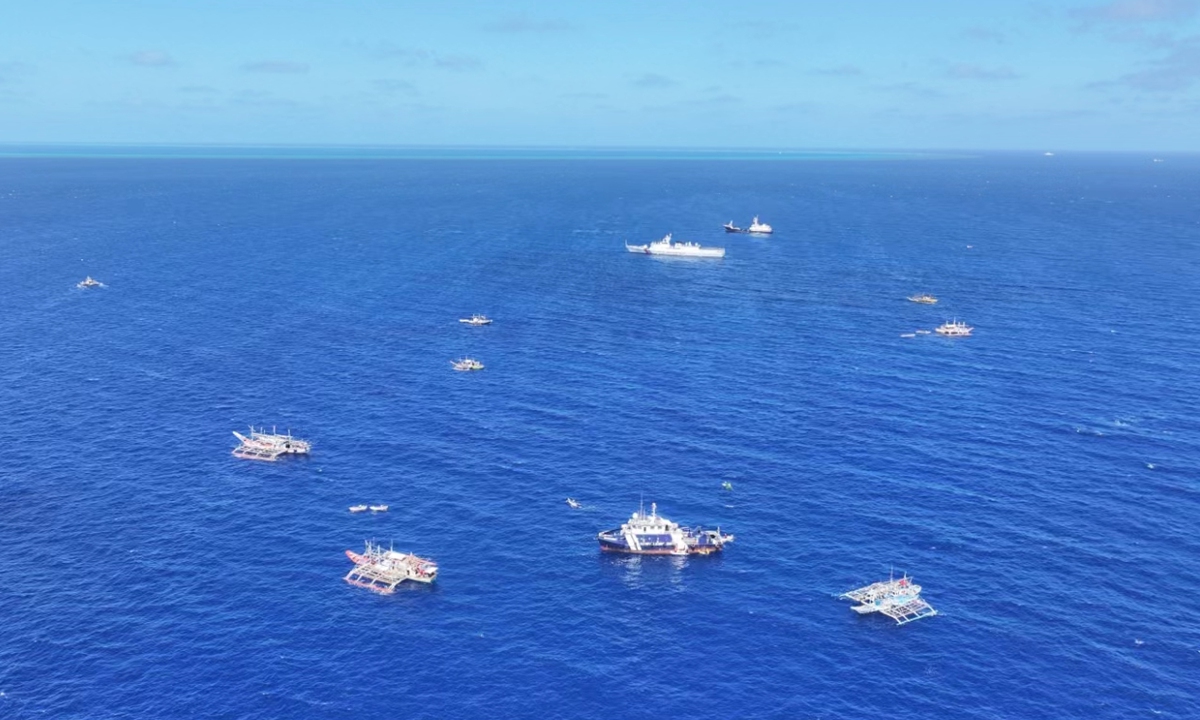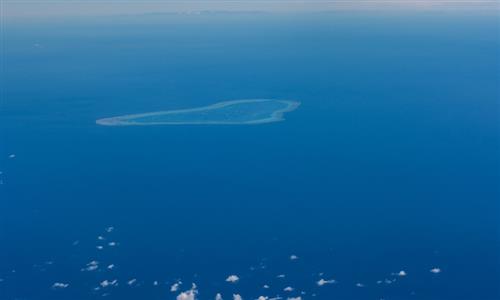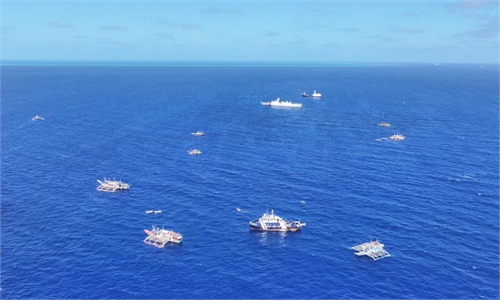Philippines smears China's professional law enforcement with fabricated claims: sources
Abusing Beijing's goodwill and restraint will incur harsher countermeasures: expert

A group of Philippine fishing vessels illegally intrude waters off China's Huangyan Dao in the South China Sea last week in an organized, provocative manner. Photos: Courtesy of a source familiar with the matter
The Philippine Coast Guard (PCG)'s recent claim that the China Coast Guard (CCG) blocked the automatic identification system (AIS) signal of a Philippines vessel in waters near China's Huangyan Dao (also known as Huangyan Island), was fake and fabricated, sources familiar with the matter confirmed with the Global Times on Monday.
Chinese experts said that the Philippines is trying to portray itself as a victim by discrediting China's professional and rational law enforcement through "cognitive warfare." They added that if Manila continues its provocation and abuses Beijing's goodwill and restraint, it will incur more severe countermeasures.
Philippine media recently hyped that their vessel BRP Datu Sanday, which was "supplying fuel to fishermen" near Huangyan Dao, was "harassed" by a China Coast Guard vessel and three other Chinese ships on February 22, citing PCG, which has accused the Chinese side of "shadowing, vessel transponder jamming and other 'dangerous maneuvers'."
Citing the PCG, the Manila Bulletin News said in its X post on Sunday that CCG "intercepted the AIS signal of a Bureau of Fisheries and Aquatic Resources (BFAR) vessel" in waters near China's Huangyan Dao.
PCG accused the Chinese side of jamming the signal of the tracking system of Philippine ships, which "briefly prevented Philippine vessels from broadcasting their positions at sea."
PCG spokesperson for the West Philippine Sea Commodore Jay Tarriela said they observed during the rotational deployments this month by PCG and BFAR ships in waters near Huangyan Dao that "there were instances" that the vessels could not transmit their AIS, according to Philippine media.
The spokesperson said on Sunday that the Philippine side "assume that they [China] do the jamming every time they release their statements that they repelled our vessels," but without providing any evidence.
The Philippine side was trying to portray itself as a victim and smearing China's proper and professional law enforcement through fabricating fake news, which is a form of "cognitive warfare," Ding Duo, deputy director at the Research Center for Ocean Law and Policy at the National Institute for South China Sea Studies, told the Global Times on Monday.
Given that the Philippines has been hyping up court action against China, recent claims regarding AIS jamming can be seen as the Philippines' self-staged falsification of evidence in an attempt to falsely accuse China's law enforcement of affecting the navigational safety of their ships, Ding said.
It's difficult for other parties to verify the Philippines' AIS-related claim due to its technical threshold, which makes the Philippines' remarks deceptive, the expert said.
On Sunday, Global Times learned from a source that the Philippines has recently organized some civilian ships to illegally intrude into waters adjacent to China's Huangyan Dao. These boats were funded with official subsidies, and used fishing activities as a cover to violate China's sovereignty and jurisdiction, leading to aggravation of the maritime situation.
According to a CCG statement released on Friday, spokesperson Gan Yu said the CCG repelled Ship 3002, which belongs to the Philippines' BFAR, in accordance with the law when it ignored repeated warnings from the Chinese side and insisted on illegally intruding. He stressed that the CCG's operation was professional, legitimate, rational and restrained.
Despite friction since August 2023, Beijing and Manila have yet to deteriorate into a real conflict due to China's responsible and necessary measures. According to a Phil Star report, the PCG found that floating barriers had been placed by the Chinese to keep Philippine fishing boats and support vessels out of Huangyan Dao.
In response, Chinese Foreign Ministry spokesperson Mao Ning said on Monday that the Philippine side has recently taken a series of acts infringing on China's sovereignty in waters off the Huangyan Dao, forcing China to take necessary measures to firmly safeguard its territorial sovereignty and maritime rights and interests.
China's actions taken so far not only safeguard its own territorial sovereignty, but also the peace and stability in the South China Sea, said Ding, noting China is also trying to bring the Philippines back to the right track of resolving and managing disputes through dialogue and consultation.
On January 17, Chinese Assistant Foreign Minister Nong Rong co-chaired the Eighth Meeting of the China-Philippines Bilateral Consultation Mechanism on the South China Sea (BCM) with Undersecretary of the Department of Foreign Affairs of the Philippines Maria Theresa P. Lazaro in Shanghai. Both sides agreed to improve maritime communication and to properly manage differences through talks.
The PCG's move clearly shows that the Philippines did not fulfill its commitments and consensus of the agreement reached between the two countries at the diplomatic level, a Beijing-based expert told the Global Times, requesting anonymity.
If the Philippines keeps ignoring and abusing the goodwill and restraint from China and continues its provocation, it will certainly invite harsher and stronger countermeasures, he noted.


